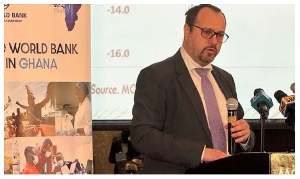The World Bank has urged government to undertake significant measures for rationalising its tax expenditures (TEs), a move aimed at ensuring the country’s tax policies are both effective and equitable.
The Bank’s recent report, ‘Strengthening Domestic Revenue Systems for Fiscal Sustainability’, presented at the 8th Ghana Economic Update underscored the importance of enhancing domestic revenue mobilisation through rigorous reforms in Ghana’s tax policy and administration.
Stefano Curto, Programme Lead speaking on behalf of the World Bank Country Director, emphasised that rationalising TEs is crucial for macroeconomic stability and sustainable growth.
“This year’s report focuses on identifying potential policy measures within Ghana’s tax policy framework and compliance mechanisms which can help generate the necessary resources to support long-term growth and poverty reduction efforts,” he stated
Rationalising TEs involves eliminating those deemed unjustified or ineffective in meeting their goals. This step is necessary as Ghana’s tax revenue has been notably lower compared to other sub-Saharan African nations and countries with similar income levels.
The report indicates that personal income tax (PIT) compliance is particularly low due to complex administration and inadequate enforcement. This has resulted in PIT contributing only 15 percent of total tax revenue and 2 percent of GDP, which is below regional averages.
The value-added tax (VAT) and excise duties also show significant gaps. VAT’s share of total tax revenue fell from 34 percent in 2015 to 17 percent in 2021, primarily due to reduced rates and exemptions. Similarly, excise duties – which contribute 1.8 percent of GDP – are lower than the regional average, with over 90 percent of the revenue coming from petroleum products.
The lack of a robust tracking system for excise duties has further compounded non-compliance issues.
Corporate income tax (CIT) revenue has also lagged, averaging 2.2 percent of GDP from 2015-2021. The complex CIT regime, characterised by 22 reduced rates, complicates tax administration and lowers the effective tax rate.
The report highlights that tax expenditures cost the nation 3.9 percent of GDP, creating complexity and revenue distortions. VAT exemptions alone account for 1.9 percent of GDP, with significant losses from exemptions on dwellings and land.
To address these challenges, the Ministry of Finance is urged to assess the impact of TE removals on poverty. Appropriate mitigating efforts should be suggested if necessary to ensure that the most vulnerable populations are not adversely affected.
Mr. Curto noted: “The burden of the economic crisis has fallen on vulnerable segments of the population. The combination of economic challenges, fiscal consolidation measures and high levels of inflation have hardened the environment for poverty reduction efforts in Ghana”.
The report proposes a comprehensive Medium Term Revenue Strategy for 2024-2027, which includes enhancing tax efforts and reorienting spending to strike a balance between fiscal outcomes and social impact. This strategy aims to facilitate better management of public finances, ensure adequate investments in critical infrastructure and bolster social programmes aimed at reducing poverty and fostering inclusive growth.
Over the past year, Ghana has made significant progress in restoring macroeconomic stability – supported by the International Monetary Fund’s Extended Credit Facility programme World Bank Development Policy Operations.
The Bank of Ghana’s monetary policy stance has been instrumental in combatting inflation and stabilising the exchange rate. Fiscal consolidation efforts have also been largely on track, with government reducing spending by 7.9 percent of GDP in 2023 compared to 2022 and implementing a domestic debt exchange programme.
Despite these efforts, Kwabena Gyan Kwakye – an economist at the World Bank Ghana Office – cautioned that the medium-term outlook remains subject to several risks. These include spending pressures prior to the 2024 elections, delays in external debt restructuring, high non-performing loans in the banking sector and global economic uncertainties.
“The path to sustainable fiscal consolidation is inextricably linked with our ability to enhance tax revenue,” Mr. Curto emphasised, highlighting the need for robust and resilient fiscal policies to navigate these challenges.
Business News of Tuesday, 23 July 2024
Source: thebftonline.com



![New IGP, COP Christian Tetteh Yohonu [L] and immediate-past IGP, Dr. Akuffo Dampare New IGP, COP Christian Tetteh Yohonu [L] and immediate-past IGP, Dr. Akuffo Dampare](https://cdn.ghanaweb.com/imagelib/pics/140/14041582.295.jpg)









